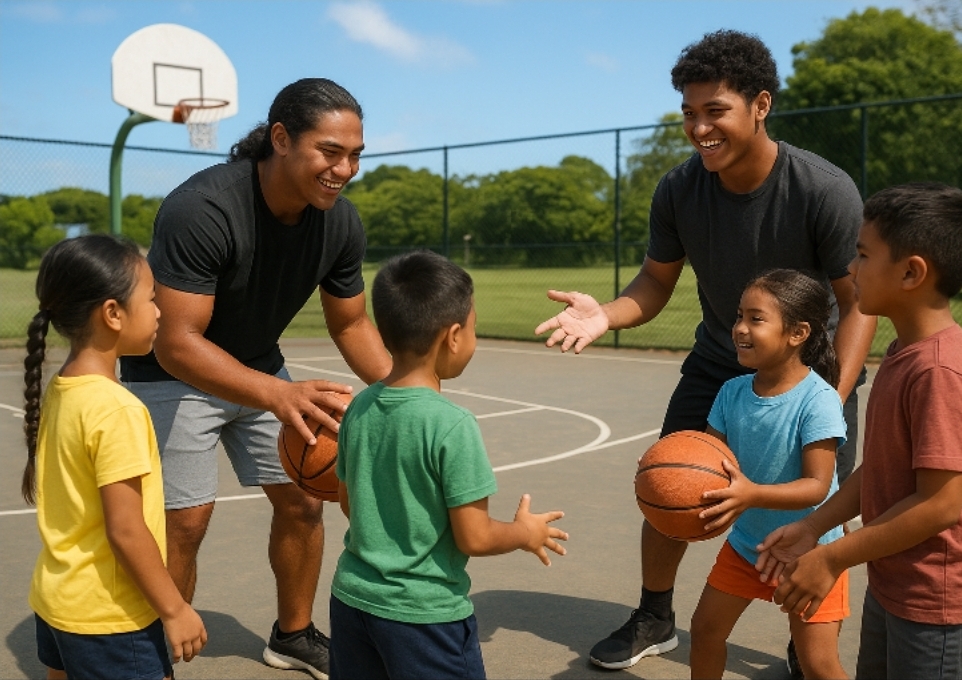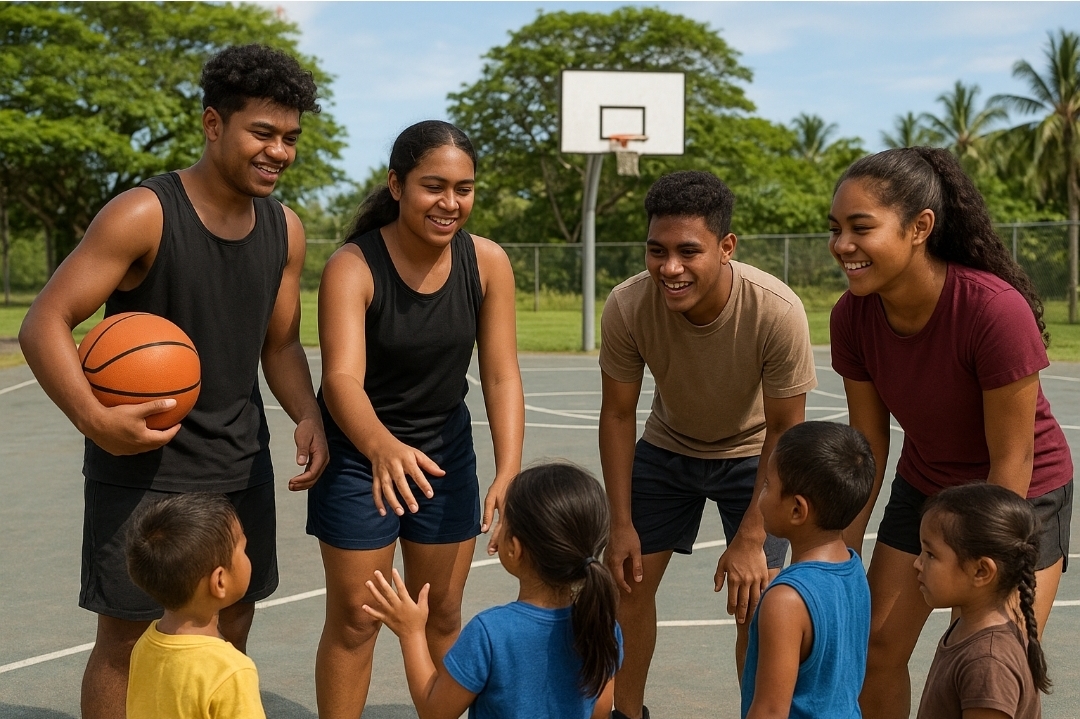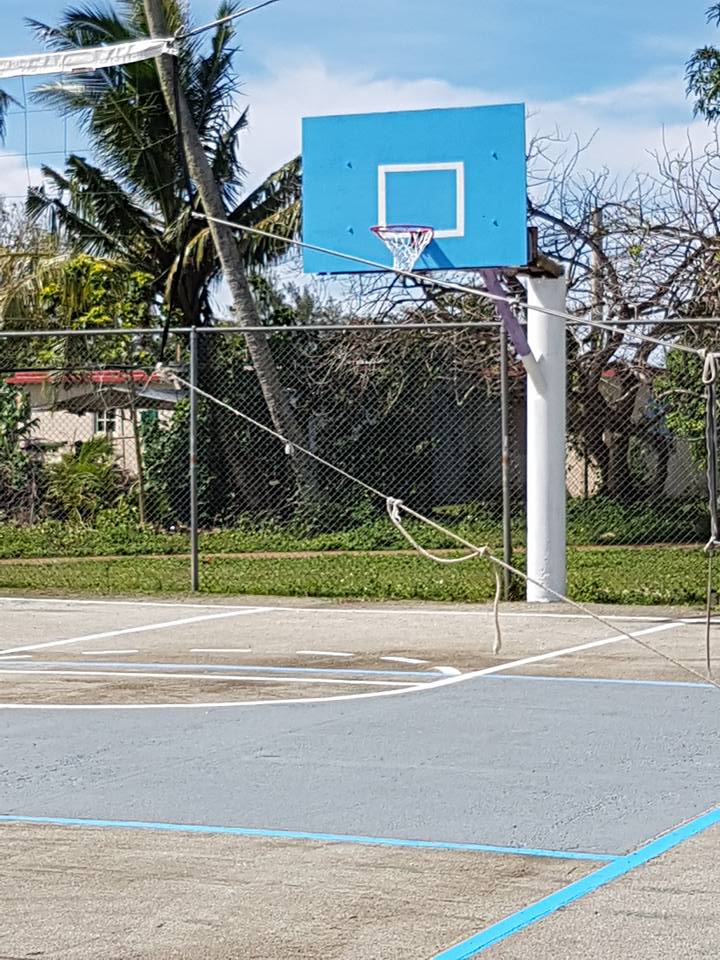Basketball Clinic in the Park
Basketball Clinic in the Park
- Status: Open Project , Ongoing Project
- Possible Hours: 5
- Categories: Social Justice, Peace and Kindness, Citizenship and Civic Engagement, Health and Wellness, Homelessness and Poverty
- Schools: Open to All Schools
- Project Start Date: 11/01/2017
- Project End Date: 05/20/2030

Basketball courts are located in 10 villages around the island. Some of these abandoned neighborhood parks need clean up projects. You can serve your community by teaching younger children the skills and rules of the game. At the same time, by making use of your neighborhood park in a positive way, you are helping to promote a healthy lifestyle to everyone in your community.
Outcomes & Benefits
Youth Participants: Gain new sports skills, healthy exercise, teamwork experience, and mentorship.
Preparation Instruction:
Needs Assessment:
Teens identify local neighborhoods with children who have limited access to organized sports programs.
Survey or informally ask parents/community leaders about interest in sports clinics.
Planning & Training:
Select teen volunteers and assign leadership roles (coaches, equipment managers, event coordinators).
Secure permissions from park authorities and gather necessary equipment (balls, nets, bats, bases, safety gear).
Provide basic coaching skills training for teens, focusing on communication with younger kids, safety, and sportsmanship.
Schedule clinic days and create a plan for each sport: warm-ups, skill drills, short games.
Community Outreach:
Announce clinics through flyers, social media, schools, and community centers.
Invite families to attend and support.
Call us to schedule an available date and which parks are available in your area. We will assist in getting your Mayor or Department of Parks and Recreation approval.
Schedule and discuss activity days
Get waiver form and release signed by your parents.
Make sure the children who sign up for the clinic have filled out the appropraite waiver forms with Island Girl Power.
Activity Instruction:
2. Action
Clinic Structure:
1. Welcome & Warm-Up (stretching, icebreaker games).
2. Skill Stations:
Basketball: Dribbling, passing, shooting drills.
Volleyball: Serving, bumping, setting practice.
Baseball: Throwing, catching, batting basics.
3. Mini Games/Scrimmages: Kids put new skills into practice in small teams.
4. Closing Circle: Encourage positive teamwork, recognize effort, and celebrate progress.
Teen Roles:
Lead drills and games, provide encouragement.
Ensure safety and fairness during activities.
Model sportsmanship and teamwork.Please take pictures and post on social media using hashtag #guamservicelearning.
Reflection Instruction:

In order to earn service learning hours, you will need to turn in a reflection to a teacher. The reflection should address: What did I do? What did I learn? What did I try to teach the the children who came to the clinic? How was this an example of service to the community?
For Teens (Service Leaders):
Group discussion after each clinic: What went well? What challenges arose?
Journaling about their personal growth, leadership skills, and how they impacted the younger kids.
Share reflections on teamwork, communication, and responsibility.
Learning Standards/Objectives:
To encourage fitness activities
To offer positive alternatives to neighborhood children
To expand the use of neighborhood parks.
Standard 1: Motor Skills and Movement Patterns
HS.1.2 Model or teach mature (proficient) motor skills and movement pattern to another student. EXAMPLE(S): Guide a peer through the steps of basketball.
Standard 5: Responsible Personal and Social Behavior
HS.5.1 Demonstrate safe and appropriate use and care of equipment and facilities. EXAMPLE(S): Anticipate potentially dangerous situations related to physical activity
HS.5.2 Relate the benefits of physical activity to social and emotional well-being. EXAMPLE(S): Participate with friends and/or family in physical activities to relax, relieve stress.
HS.5.3 Describe the potential physiological risks associated with physical activity in various environments. EXAMPLE(S): Monitor temperature and humidity; drink water while in hot weather.
HS.5.4 Apply game rules accurately and fairly during activity. EXAMPLE(S): Self-officiate a game with respect and compassion for children with individual differences.
CONTACT PERSON DETAILS
Name: Kurason I Sengsong
Phone: 671-688-4752
Organization/Agency/Business Name: Kurason I Sengsong
Acknowledged by Teacher/Guidance Counselor:
Print name: _____________________________
Signature:_______________________________
Date:______________________



 In order to earn service learning hours, you will need to turn in a reflection to a teacher. The reflection should address: What did I do? What did I learn? What did I try to teach the the children who came to the clinic? How was this an example of service to the community?
In order to earn service learning hours, you will need to turn in a reflection to a teacher. The reflection should address: What did I do? What did I learn? What did I try to teach the the children who came to the clinic? How was this an example of service to the community? 







